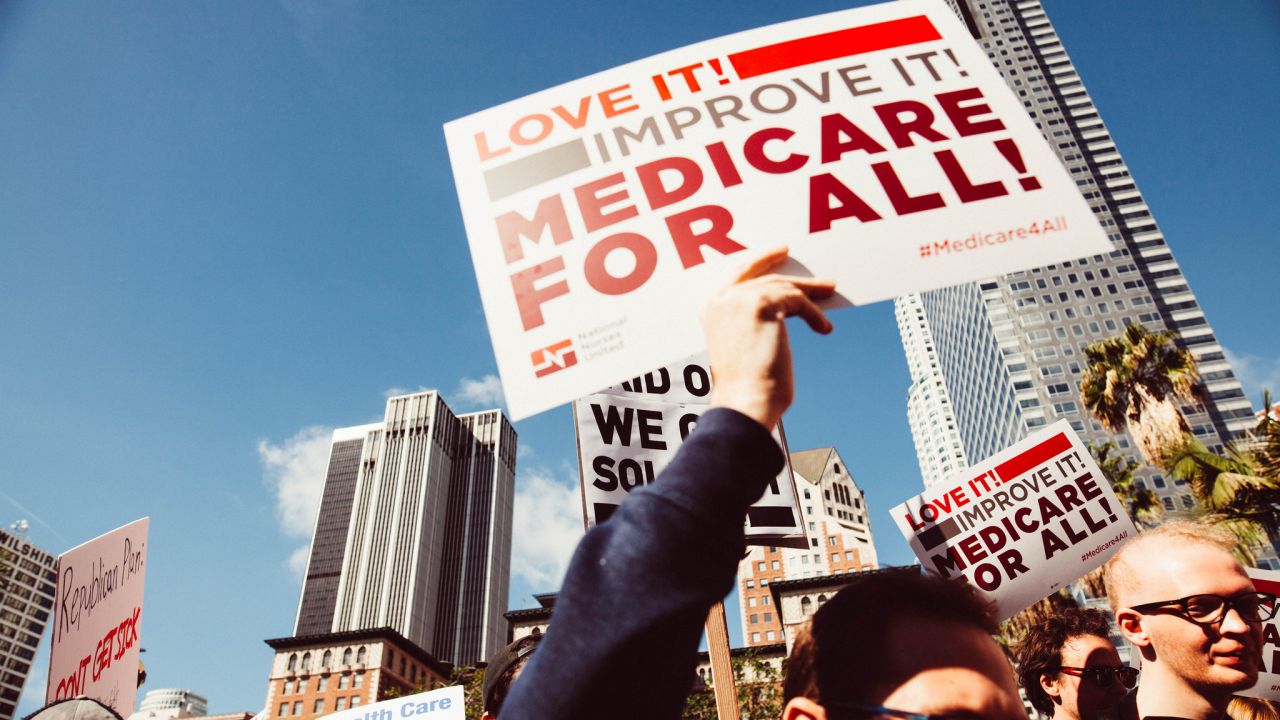
Medicare for all rally in Los Angeles in February 2017. (Photo by Molly Adams/ flickr CC 2.0)
This post originally appeared on The Nation.
The Democratic National Committee’s platform committee approved a draft of the party’s 2020 agenda this week and committee cochair Denis McDonough promptly described it as the “boldest Democratic platform in American history.”
It’s not—unless your definition of “bold” includes a tepid health care stance that rejects the single-payer Medicare for All agenda that enjoys overwhelming support from Americans in this Covid-19 moment.
The proposed platform also pulls its punches on a host of other issues, from marijuana legalization, an end to qualified immunity for police officers, the placing of conditions on aid to Israel, a federal jobs guarantee, and a comprehensive approach to developing and implementing a Green New Deal.
Every Democratic platform is a complex document that blends ideas from the various ideological factions that make up the party, and this draft document is no different. The 2020 draft includes a number of solid stances that respond to pressure from progressives to move the party to the left. It sets some clear goals for combating climate change, reflecting the movement of presumptive nominee Joe Biden on the issue. “It also calls,” as NPR notes, “for a $15 minimum wage, mandatory paid family leave, more federal gun control, broad changes to federal sentencing guidelines and drug laws, and many other changes that most Democratic candidates for Congress and the White House have supported for years.”
But it is hard sell to claim that this is the boldest Democratic platform in American history.
The 1900 Democratic platform began by “warn[ing] the American people that imperialism abroad will lead quickly and inevitably to despotism at home.” That was bold.
The 1932 Democratic platform announced, in the midst of the Great Depression, that the party was committed to “stamping out monopolistic practices and the concentration of economic power.” That was bold.
The 1944 Democratic platform asserted, in a time of Jim Crow segregation when the party relied on the “solid South” as a part of its coalition, that “racial and religious minorities have the right to live, develop and vote equally with all citizens and share the rights that are guaranteed by our Constitution.” And it argued that “Congress should exert its full constitutional powers to protect those rights.” That was bold.
The 1960 Democratic platform declared, at a point when new technologies were transforming workplaces, that “we will provide the government leadership necessary to insure that the blessings of automation do not become burdens of widespread unemployment.” That was bold.
The 1972 Democratic platform promised “to rethink and reorder the institutions of this country” to address systemic racism and sexism and classism—and it outlined a plan to “restructure the social, political and economic relationships throughout the entire society in order to ensure the equitable distribution of wealth and power.” That was bold. So, too, was the document’s recognition that a for-profit health care system was failing the United States—and its commitment to “establish a system of universal National Health Insurance which covers all Americans with a comprehensive set of benefits including preventive medicine, mental and emotional disorders, and complete protection against catastrophic costs, and in which the rule of free choice for both provider and consumer is protected. The program should be federally-financed and federally-administered.”
From the 1940s through 1980, on health care issues, Democratic platforms took bolder stands than does the party’s 2020 draft platform. “Progressive ideas are nothing new,” notes Representative Ro Khanna, a cochair of the California delegation to this year’s convention, who argues that “there’s no reason we can’t finish enacting those policies today.”
Unfortunately, the platform committee does not propose to do so.
A Medicare for All amendment advanced by supporters of the 2020 presidential bid of Vermont Senator Bernie Sanders was rejected overwhelmingly on Monday, garnering just 36 “yes,” versus 125 “no,” votes from a committee dominated by Biden backers. Proposals to lower the Medicare eligibility age and expand access for children were also rejected.
The party’s refusal to support Medicare for All is wrongheaded practically, as Michael Lighty noted Monday when he urged platform committee members to join civil rights groups in supporting Medicare for All. “It’s vital that we meet this moment that demands health justice and Medicare For All to create a system to address the health inequities exposed by the COVID-19 pandemic when Blacks and Latinos are dying at rates two-, two-and-a-half-times that of whites,” said the veteran single-payer activist.
The party’s refusal to support a single-payer system is also wrongheaded politically, as the campaigns of Sanders and a rising generation of Democratic members of Congress have popularized the Medicare for All agenda to such an extent that recent polling finds it is supported by 69 percent of all Americans and 88 percent of Democrats.
“The Democrats are making a fatal mistake by turning their backs on Medicare for All,” argues Winnie Wong, a former senior political adviser to the Sanders campaign, more bluntly. She labeled the committee votes “shameful” at a time “when the country is in the death grip of a global pandemic and people are dying” because they can’t afford health care.
Shameful enough to oppose the whole of the platform? A substantial number of delegates think so.
Sanders delegates from Nevada have called on convention delegates to sign a petition that concludes with a “pledge to vote against any platform that does not include a plank supporting universal, single-payer Medicare for All.” Progressive Democrats of America, RootsAction.org, and other groups are circulating the petition and, according to Jeff Cohen of RootsAction, it had been signed by 700 delegates as of Tuesday afternoon.
Norman Solomon, a Sanders delegate and the national director of RootsAction.org, says, “It’s a reasonable hope that historians will look back at the next couple of weeks as a time when hundreds of delegates stepped forward and said, ‘This is a red line for a humane society and we’re not going to stop saying so.’”




